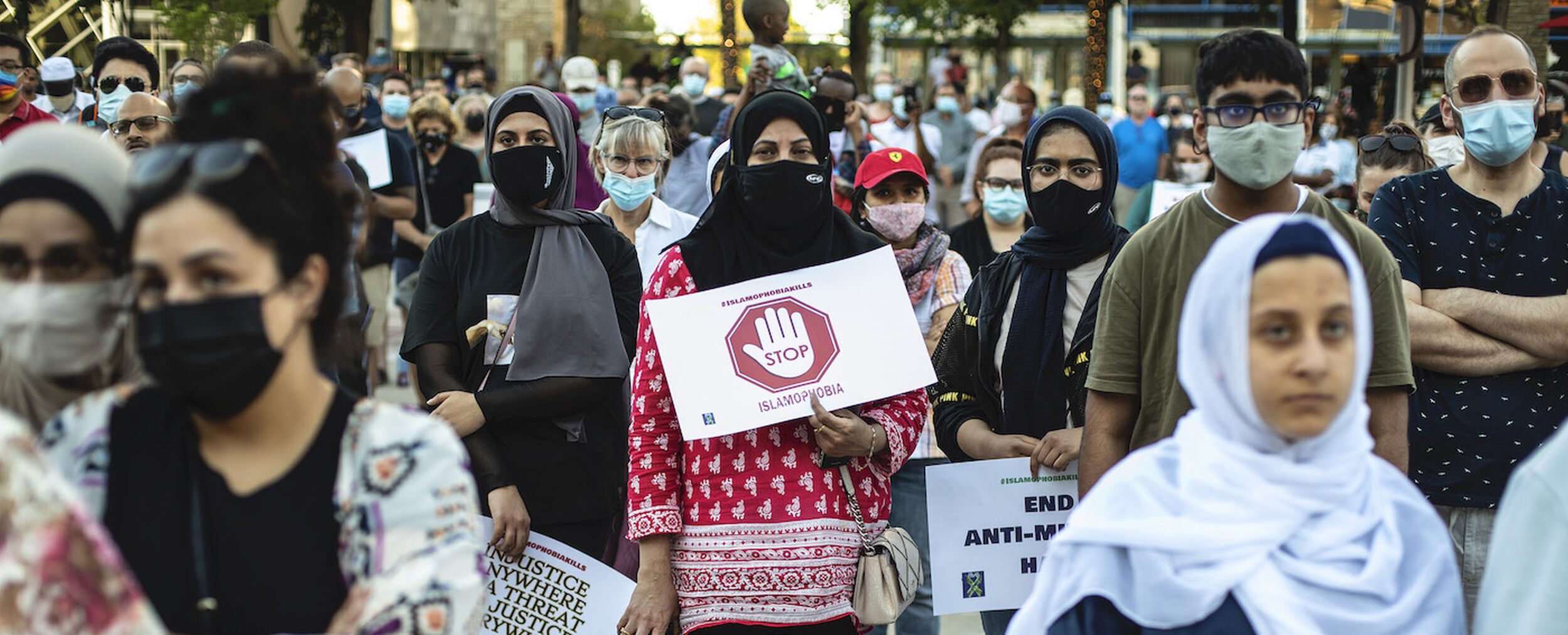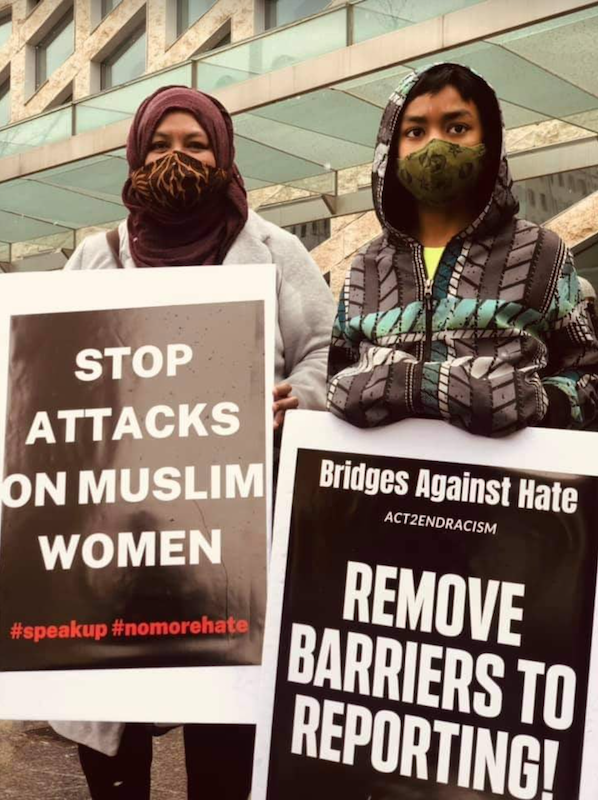
Supporters at an anti-Islamophobia rally in Edmonton on June 25, 2021. Photo: The Canadian Press/Jason Franson.
A grassroots answer to Islamophobia in Edmonton
Who’s looking out for the victims of hate-motivated attacks?
Support independent Calgary journalism!
Sign Me Up!The Sprawl connects Calgarians with their city through in-depth, curiosity-driven journalism. But we can't do it alone. If you value our work, support The Sprawl so we can keep digging into municipal issues in Calgary!
When a century-old Catholic church in Morinville, just north of Edmonton, was razed to the ground in June, Alberta Premier Jason Kenney was on the scene hours later to denounce “what appears to be a hate-motivated act of violence.” Similar circumstances had befallen half a dozen churches across the country in the week prior, and police, who deemed the incident suspicious, were investigating it as an arson.
The same day, Kenney said the province would double a recently announced security infrastructure grant to $2 million and make emergency funding immediately available to facilities at risk of hate crimes. He even released a slick and poignant video shot on site where he lamented the loss of the church, reflected on its value to the community, and called on the country’s leadership to condemn a “profoundly unCanadian” act.
Wati Rahmat, a Muslim woman and community activist in Edmonton, couldn’t help but notice the province’s swift and decisive response to the tragedy, especially when she considers how it has handled a pattern of attacks targeting Black and Muslim women since December 2020.
We want to feel like our lives and our security and our safety are as important as a church building.
“They make statements here and there, but not to the degree when a church burns,” Rahmat said. “We want that. We want to feel like our lives and our security and our safety are as important as a church building, as infrastructure, as a concrete building.”
Lost amid announcements for funding and enforcement, she adds, are the voices and needs of those at the centre of this dangerous trend: Muslim women who’ve been victimized—directly or otherwise—by hate.
A victim-centred approach
On July 10, Justice Minister Kaycee Madu said his department will create a community liaison to connect with targeted groups, as well as a provincial hate crime unit (the Alberta NDP said it would create a similar unit back in 2018).
His answer came seven months after the trend began, when two women wearing hijabs suffered racial slurs and a violent attack outside a south Edmonton mall. A day after the announcement, another Black woman, also wearing a hijab, was attacked in north Edmonton.
Why not try meeting with Muslim women?
— vanessa hunt (@themessiestness) July 1, 2021
In February, a month that saw at least three separate attacks against veiled and hijabi women in Edmonton, Rahmat founded Sisters’ Dialogue, a volunteer-driven, grassroots effort that offers victim-centred care for women in Muslim and marginalized communities. The initiative is geared toward both the direct and indirect victims of hate-motivated attacks.
“The vicarious trauma from all these attacks for Muslim women is very real,” Rahmat said. “A lot of women are scared to leave their homes, or they’ve changed their routine or their way of dress. It’s really affecting women in our community—the Muslim women especially—if they wear the veil and they are racialized.”

Many victims of hate-motivated crimes don't know that law enforcement agencies like Edmonton Police Service (EPS) have victim support services, she adds, and those that do are hesitant to reach out because they see problems with how police deal with people of colour.
“A lot of racialized women, especially Black women, don’t feel safe going to the EPS,” Rahmat said.
In response to these attacks, she adds, Sisters’ Dialogue has been providing victim supports through healing circles, group sharing sessions, and referrals to culturally sensitive mental health professionals.
Irfan Chaudhry, a criminologist and hate-crime researcher at MacEwan University in Edmonton, says there’s a disconnect between the needs of hate-crime victims and victim services available through police.
"If we rely just on the law enforcement perspective of supporting victims of a hate crime, it's not setup appropriately at all," he says, "and that’s where I think community can fill the gap."
However, Chaudhry adds, without connections to policymakers or politicians, grassroots efforts to deal with Islamophobia often go unnoticed and unsupported. Rahmat agrees that addressing hate through legislation would help, but advocating for that sort of change is difficult for a group comprising and caring for victims.
“We’re not policy people," she said, "That’s not our language."
Looking for legislation
While the frequency of attacks against Muslim women has put Edmonton in the spotlight, these incidents are symptoms of a wider problem playing out in cities across the country.
In 2017, a gunman killed six Muslim men at a Quebec City mosque and injured 19 others. In London, Ont., a man accused of running over a Muslim family with his vehicle in June is facing murder and terrorism charges. That same month, a Muslim man in Saskatoon was stabbed, beaten and had his beard cut off.
Women know what we want. We know what kind of help we need.
In the wake of these attacks, the federal government will host national summits on antisemitism and Islamophobia on July 21 and 22. The National Council of Canadian Muslims released 60 policy recommendations on Monday for all levels of government to consider ahead of the event.
The recommendations include amendments to Canada’s Criminal Code, such as setting specific penalties for hate-motivated attacks. The council also recommends provinces pass legislation that prohibits white supremacist rallies on provincial property.
Following rail blockades last year that protested pipeline construction in Wet’suwet’en traditional territory, Alberta's government has previously taken action to control demonstrations with Bill 1, which makes it illegal to protest on essential infrastructure.
“We’ve seen this government do that, so why aren’t we seeing similar considerations for hate groups or hate symbols that are popping up at some of these rallies,” Chaudhry said. Protests against public health restrictions in Edmonton and Calgary recently saw demonstrators carrying tiki torches—a racist symbol after the lights were used by white nationalists in the U.S.
The council's recommendations are careful to note that such legislation shouldn't limit "freedom to dissent." Similar concerns cropped up south of the border when lawmakers in Oregon voted to criminalize the use or display of a noose—a symbol of violence against racialized communities—to intimidate.
While governments closer to home work on their own response to fighting hate, Rahmat says the Sisters’ Dialogue will strive to meet Edmonton’s Muslim community, especially the women, where they’re at.
“Women know what we want," she said. "We know what kind of help we need, so that’s why we’re asking for different levels of government to reach out to us and seek our advice on what should be done."
Hamdi Issawi is The Sprawl's Edmonton editor.
Support independent Calgary journalism!
Sign Me Up!The Sprawl connects Calgarians with their city through in-depth, curiosity-driven journalism. But we can't do it alone. If you value our work, support The Sprawl so we can keep digging into municipal issues in Calgary!




